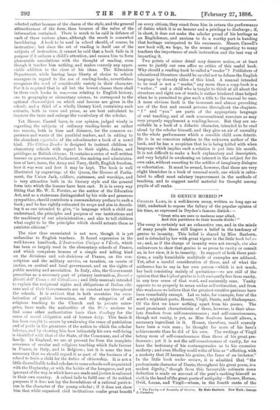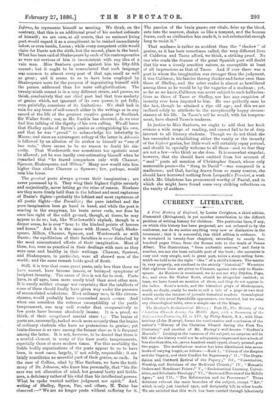IS GENIUS MORBID Pio
CHARLES LAMB, in a well-known essay, written so long ago as 1826, undertook to expose the fallacy of the popular opinion of his time, as expressed in Dryden's famous distich :— "Great wits are sure to madness near allied,
And thin partitions do their bounds divide ! "
The essay is certainly not an exhaustive one, and in the minds of many people there still lingers a belief in the tendency of genius to insanity. This belief is shared by Miss Sanborn, and is defended by her with great vigour in the little book bef >re us ; and, as if the charge of insanity were not enough, she also endeavours to show that genius is as prone to vanity or conceit as, in her view, it is to insanity. In support of both these posi- tions, a really formidable multitude of examples are adduced. Yet, after a careful consideration of these, and of what the authoress has to say in her own person—which is not much, her book consisting mainly of quotations—we are still of the opinion that the highest genius is both eminently free from vanity, in any true sense of that word, and eminently sane. Vanity appears to us properly to mean undue self-estimation, and from this weakness we believe that the greatest creative geniuses have been remarkably exempt. Let us take, for example, four of the word's mightiest poets, Homer, Virgil, Dante, and Shakespeare. Of the first we know nothing apart from his poems. The most prominent characteristic of these, however, is their abso- lute freedom from self-consciousness; and self-consciousness, though not vanity, is yet, as Miss Sanborn herself allows, a necessary ingredient in it. Homer, therefore, could scarcely have been a vain man ; he thought far more of his hero's achievements than he did of his own. The writings of Virgil betray more of self-consciousness than those of his great pre- decessor; yet it is not the self-consciousness of vanity, for we have tbe testimony of his contemporaries as to his excessive modesty ; and even Shelley could write of him as "affecting, with a modesty that ill became his genius, the fame of an imitator." In the little book under review, it is admitted that "the predominate character of Dante, throughout his great poem, is a modest dignity," though from this favourable estimate some deduction is made on account of the poet's ranking himself as sixth in the band of the great poets of antiquity —Homer, Horace, Ovid, Lucan, and Virgil—whom, in the fourth canto of the
ism in the character of theyoung scholar ; if it does not show
him that while organised civil institutions confer great benefit j.•eThem Vanity and insanity of Genius By Kate Sanborn. New York : George
Inferno, he represents himself as meeting. We think, on the contrary, that this is an additional proof of his modest estimate of himself ; we are sure, at all events, that no eminent living poet would regard it as a compliment to be ranked immediately below, or even beside, Lucan ; while every competent critic would claim for Dante not the sixth, but the second, place in the band. What has been said of Shakespeare by such of his contemporaries as were not envious of him is inconsistent with any idea of a vain man. Miss Sanborn quotes against him his fifty-fifth sonnet ; but it ought to be remembered that such language was common to almost every poet of that age, small as well as great ; and it seems to us to have been employed by Shakespeare more for the purpose of ingratiating himself with the person addressed than for mere self-glorification. The twenty-ninth sonnet is in a very different strain, and proves, we think, conclusively that our chief poet had that true modesty of genius which, not ignorant of its own power, is yet fully, even painfully, conscious of its limitations. We shall look in vain for any trace of self-conceit either in the writings or in any record of the life of the greatest creative genius of Scotland, Sir Walter Scott; nor, as Mr. Ruskin has observed, do we ever find him talking of the dignity of his own calling. We all know that Shelley spoke of Byron's genius as extinguishing his own, and that he was " prond " to acknowledge his inferiority to Moore; and since an extravagant eulogy of the latter in Aclonais is followed by an allusion of its author to himself as "one of less note;' there seems to be no reason to doubt his sin- cerity. That Wordsworth was sometimes too egotistic must be allowed; yet he was hardly over-estimating himself when he remarked that "he feared comparison only with Chaucer, Spenser, Shakespeare, and Milton." Many now would rate him higher than either Chaucer or Spenser ; few, perhaps, would rate him lower.
The greatest poets always possess their imagination ; are never possessed by it. They wing their highest flights serenely and majestically, never letting go the reins of reason. Nowhere are they more firmly held than in the loftiest and most rapturous of Dante's flights—probably the loftiest and most rapturous of all poetic flights—the Paradiso ; the pure intellect and the pure imagination here go hand in hand, and while the poet is soaring in the empyrean, his brain never reels, nor does he once lose sight of the solid ground, though, at times, he may appear to du so ; but, like Wordsworth's skylark, though in a deeper sense, he is ever "true to the kindred points of heaven and home." And it is the same with Homer, Virgil, Shake- speare, Milton, Chaucer, Spenser, and Wordsworth as with Dante; the equilibrium of their faculties is never disturbed by the most concentrated efforts of their imagination. Most of them, too, were as practical in their dealings with men as they were sane and healthy in their writings. Chaucer, Spenser, and Shakespeare, in particular, were all shrewd men of the world ; and the same remark holds good of Scott.
Still, it is true that some great poets, only less than those we have named, have become insane, or betrayed symptoms of incipient insanity. The cause of this is not far to seek. Poets have, in all ages, been more sorely tried than most other men. It is surely neither strange nor surprising that the intellects of some of these should finally have given way under the pressure of accumulated misfortune. Most ordinary men, in like circum- stances, would probably have succumbed much sooner. And when one considers the extreme susceptibility of the poetic temperament, one may well wonder that comparatively so few poets have become absolutely insane. It is a proof, we think, of their exceptional mental stren to. The brains of poets are, necessarily, tasked much more severely than the brains of ordinary students who have no pretensions to genius; yet brain-disease is as rare among the former class as it is frequent among the latter. It is not, however, to be denied that there is a morbid element in many of the finer poetic temperaments, especially those of more modern times. For this morbidity the feeble bodily organisations of the poets appear to us to have been, in most cases, largely, if not solely, responsible ; it cer- tainly constitutes no essential part of their genius, as such. In the case of Collins, cited by Miss Sanborn, we have the testi- mony of Dr. johnson, who knew him personally, that "his dis- ease was not alienation of mind, but general laxity and feeble- ness, a deficiency rather of his vital than his intellectual powers. What he spoke wanted neither judgment nor spirit." And, writing of Shelley, Byron, Poe, and others, M. Take has observed :—" We are no longer poets without suffering for it.
The passion of the brain gnaws our vitals, dries up the blood, eats into the marrow, shakes us like a tempest, and the human frame, such as civilisation has made it, is not substantial enough long to resist it." • That madness is rather an accident than the " shadow " of genius, as it has been sometimes called, the very different lives of Calderon and Tasso afford, we think, a striking proof. No one who reads the dramas of the great Spanish poet will doubt that his was a keenly sensitive nature, as susceptible at least of all impressions as that of Tasso. And if ever there was a poet in whom the imagination was stronger than the judgment, it was Calderon; his fancies throng thicker and faster even than those of Shelley, and the sober reader is almost as bewildered among them as he would be by the vagaries of a madman ; yet, so far as we know, Calderon was never subject to such hallucina- tions as those of Tasso or Shelley, nor has any suspicion of insanity ever been imputed to him. He was perfectly sane to the last, though he attained a ripe old age ; and this we are inclined solely to attribute to the exceptionally happy circum- stances of his life. In Tasso's cell he would, with his tempera- ment, have shared Tasso's madness.
In justice to Miss Sanborn, we ought to add that her book evinces a wide range of reading, and cannot fail to be of deep interest to all literary students. Though we do not think she has succeeded in establishing either the vanity or the insanity of the highest genius, her little work will certainly repay perusal, and should be specially welcome to all those—and we fear they are not a few—who think as she does. It is somewhat singular, however, that she should have omitted from her account of " mad " poets all mention of Christopher Smart, whose only memorable poem—the "Song to David "—was composed in a madhouse; and that, having drawn from so many sources, she should have borrowed nothing from Leopardi's Pensieri, a work which Mr. Gladstone has pronounced worthy of Pascal, and in which she might have found some very striking reflections on the vanity of authors.



































 Previous page
Previous page